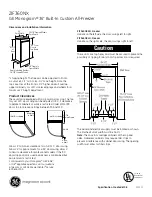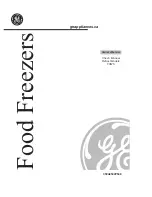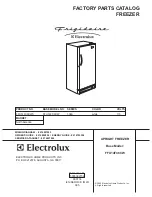
48
49
© 2021, Elon Group AB. All rights reserved.
3. MAINTENANCE AND CARE OF FREEZER
3.1 CLEANING
• Dust should be removed regularly from behind and beneath the freezer to
improve the cooling effect and save energy.
• Check the door gasket regularly to make sure there is no debris. Clean the
door gasket with a soft cloth dampened with soapy water or diluted detergent.
• The interior of the freezer should be cleaned regularly to avoid odour.
• Turn off the power before cleaning the interior, remove all food, drinks,
shelves, drawers, etc.
• Use a soft cloth or sponge to clean the inside of the freezer, using two tablespoons of baking soda
in a litre of warm water. Then rinse with water and wipe clean. After cleaning, open the door and let
the interior dry naturally before turning on the power.
• For areas that are difficult to clean inside the freezer (such as narrow channels, gaps or corners),
it is recommended that they are wiped regularly with a soft cloth, soft brush, etc., or if necessary,
in combination with suitable tools (such as thin scrapers) to ensure no contaminants or bacterial
accumulation in these areas.
• Do not use soap, detergent, abrasive powder, spray cleaner, etc., as these may cause odours in
the interior of the freezer or contaminate the food.
• Clean the bottle frame, shelves and drawers with a soft cloth dampened with soapy water or
diluted detergent. Dry with a soft cloth or dry naturally.
• Wipe the outer surface of the freezer with a soft cloth dampened with soapy water, detergent, etc.,
and then wipe dry.
• Do not use hard brushes, scourers, wire brushes, abrasives (such as toothpaste), organic solvents
(such as alcohol, acetone, banana oil, etc.), boiling water, acid or alkaline cleaners, which may
damage the freezer surface and interior. Boiling water and organic solvents such as benzene may
deform or damage plastic parts.
• Do not rinse directly with water or other liquids during cleaning to avoid short circuits or affect
electrical insulation after immersion.
3.2 DEFROSTING
• The freezer must be manually defrosted.
Disconnect the plug from the wall socket, open the door, remove all the food and put it somewhere
cool.
It is recommended that the frost is removed using a plastic scraper, or let the temperature rise
naturally until the frost melts. Then wipe away the remaining ice and water, insert the plug in the
socket and turn on the freezer.
Always unplug the freezer before defrosting and cleaning.
Do not use any mechanical devices or other means to accelerate defrosting except those
recommended by the manufacturer. Do not damage the refrigerant circuit.















































